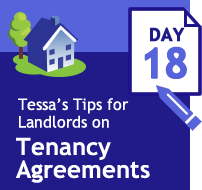Dealing with responsibility for bills in your tenancy agreement
All properties have expenses which need to be paid, such as utilities and Council tax. It is important to be clear in your tenancy agreement about who pays what.
There are a number of approaches that can be taken:-
1. Tenants are responsible for everything.
This can best be done if the tenants are renting the whole house or flat. You need to make sure that the utilities are all put into the tenants name, and then if they are not paid, you will not be liable.
Sometimes an account cannot be put into the names of the tenants. For example the water meter may serve more than one property. Or there may be several tenants sharing who are unwilling to have the utilities put in their name as it will potentially make them liable for the whole lot. Here you need to have a procedure where you invoice them regularly. The tenancy should make it clear that they are, collectively, responsible for paying these bills, not you.
However as these accounts will be in your name, you will be responsible to the supplier, whether or not the tenants re-imburse you.
2. Tenants are responsible for some payments, landlords for others
For example sometimes the landlord will pay the water rates and the Council Tax (which will be included in their rent), but will want the tenants to pay everything else, such as electric and gas. Again, set out clearly those that you will pay and those that they pay. Make sure that your rent is set at a sufficient level to cover the payment of the items you are responsible for.
Note that you need to be careful if you are paying for water, as it is not unknown for tenants with a grudge to deliberately drive up the bill by turning the taps on for long periods.
3. Landlord responsible for most bills
This is sometimes done, particularly where the tenants rent a room in a shared house. We have a special agreement for this on Landlord Law which I created at the request of some of our members.
The agreement has a schedule where the landlord lists all the bills he is paying (anything else is the tenants’ responsibility), and the rent figure stipulates how much of the rent is attributed to these. Then the terms and conditions provide that if the sum paid by the landlord for these items turns out to be much higher than the sum allowed for in the rent, the landlord can increase the rent to cover the difference, subject to providing proof if the tenant requests it.
Whatever arrangement you have, it needs to be clearly set down so everyone knows what they are responsible for paying.
Some specific bills
Water – Water authorities have had such problems with tenants running up bills and then leaving without paying, that, in Wales, there are now special rules which provide for landlords to give information about the tenants or be jointly liable with them for the cost. No doubt similar rules will come into force in due course in England.
Council Tax – as there are sometimes restrictions on whether landlords can pass the cost of this on to tenants, it is a good idea to deal with Council Tax in a separate clause. Then if this is found invalid (and the clause become unenforceable) it will not affect payment of other utilities.
 NB Find out more about my Tenancy Agreement Service on Landlord Law
NB Find out more about my Tenancy Agreement Service on Landlord Law
We have several agreements which provide for landlords to pay the bills as well as agreements with more standard arrangements.
